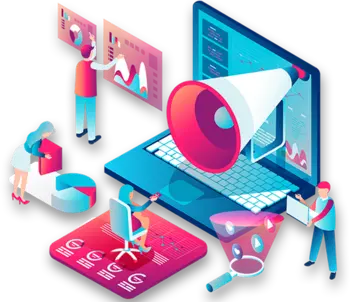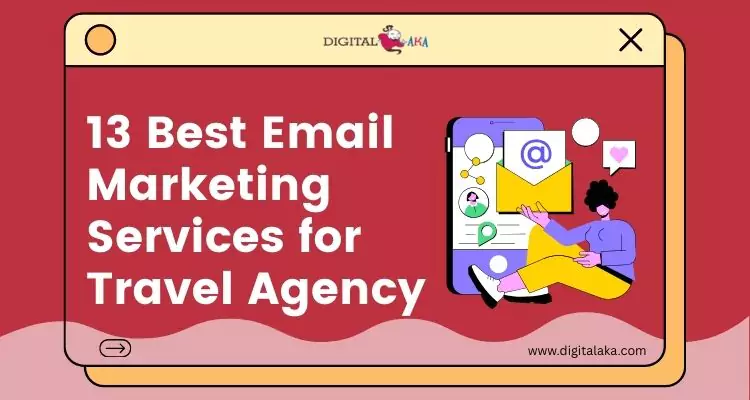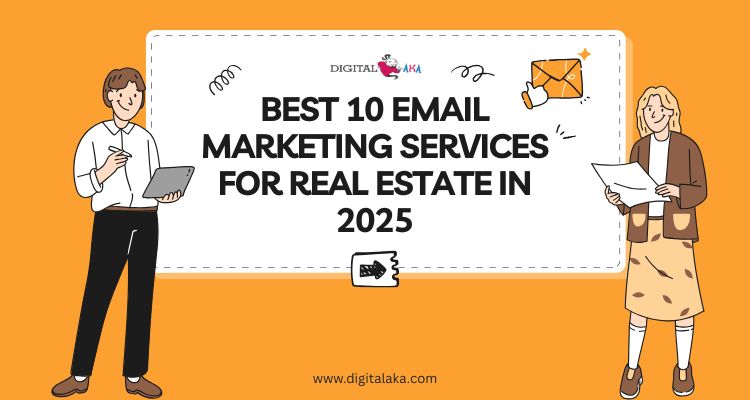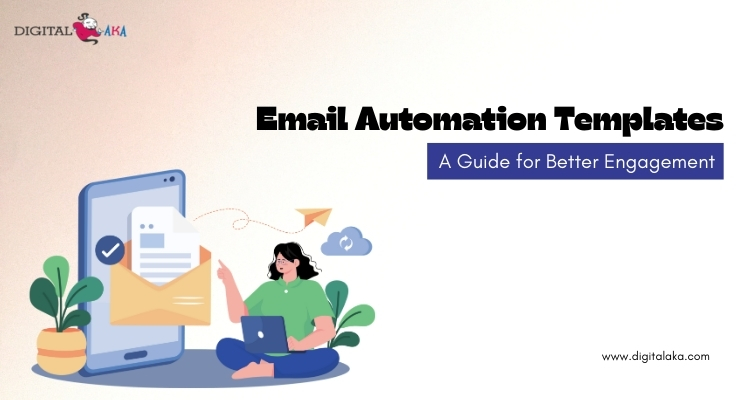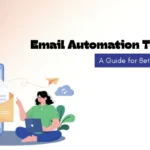
Email Automation Templates- A Guide for Better Engagement
April 14, 2025
Best 10 Email Marketing Services for Real Estate in 2025
April 28, 2025AI-driven personalization is changing the way businesses talk to and connect with people. It uses artificial intelligence (AI) to learn what people like, want, or need. Then, it helps give them more of what they are interested in. This makes their experience better and more useful. In schools, AI can help students learn in ways that work best for them. It can suggest lessons or activities based on how they learn. In marketing, AI helps companies show the right ads or products to the right people. This makes customers more likely to buy something or stay interested.
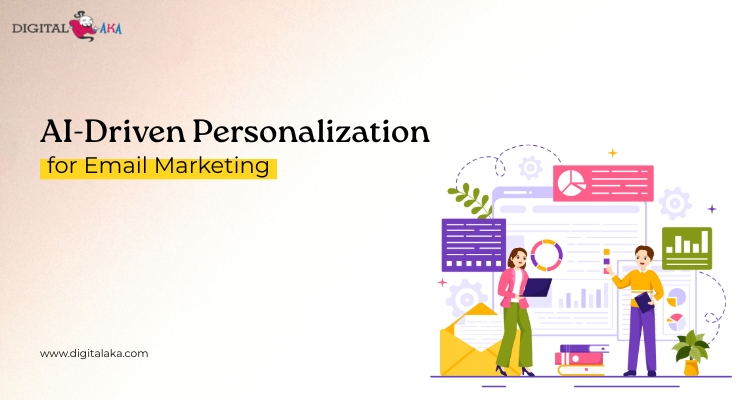
Overall, AI-driven personalization is helping many industries grow. It makes services more personal and helpful. Businesses can build stronger relationships with their customers by giving them what they truly want. As AI gets smarter, the ways it can improve our experiences will only get better.
Table of Contents
Understanding AI-Driven Personalization
AI-driven personalization means using artificial intelligence (AI) to give people more personalized and helpful experiences. Instead of showing the same thing to everyone, AI looks at what each person likes, does, or needs. Then, it changes the content, suggestions, or services to match that person better.
For example, if you watch a lot of funny videos online, AI might start showing you more of those videos. Or if you often shop for sports clothes, it may show you new items in that category. This is different from the old way, where everyone in a group would get the same content.
With AI, changes happen quickly and can be different for each person. This makes people feel more connected and helps companies give better email service. It can be used in websites, apps, online stores, and more to create a smoother, more useful experience for each user.
Pricing
| Trail Plan | Standard Plan | Premium Plan | Professional Plan |
| $50 | $145 | $185 | $225 |
| Sending Limit | Sending Limit | Sending Limit | Sending Limit |
| 1000 Emails/Hour | 1500 Emails/Hour | 3000 Emails/Hour | 5000 Emails/Hour |
Key Components of AI-Driven Personalization
AI-driven personalization means using smart computer systems to give people exactly what they want. It has three main parts:
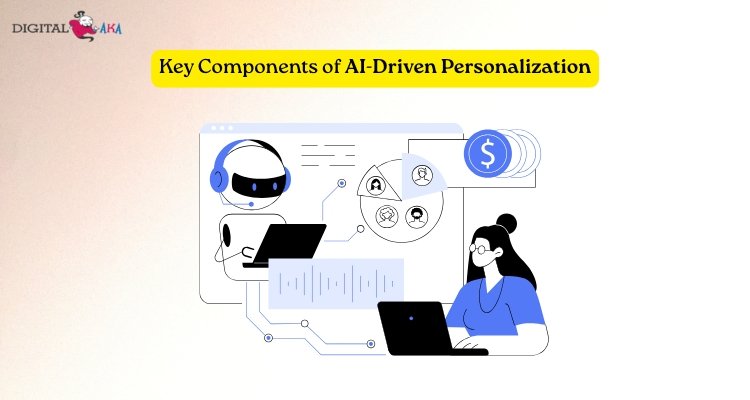
1. Collecting and Studying Data: AI collects information about people—like what they click on, what they buy, and what they look at online. This helps it understand each person’s likes and habits.
2. Predicting What People Will Do: After studying past behavior, AI can guess what someone might like or want next. For example, if you often watch cooking videos, it may show you new ones without you asking.
3. Changing Things Right Away: AI doesn’t wait. It can quickly change the content you see—like showing you different products or suggestions—based on what you’re doing right now.
AI-Driven Personalization in Email Marketing
Email marketing remains a powerful tool for businesses, and AI-driven personalization email marketing is taking its effectiveness to new heights. By leveraging AI, marketers can create highly targeted and personalized email campaigns that resonate with individual recipients.
Benefits of AI-Driven Email Personalization
1. Better Engagement: When you send personalized emails to each person based on their interests and behavior, they are more likely to open the email and click on the links inside. For example, if an email talks about something the person has shown interest in before, like a product they looked at or an article they read, they will feel more connected to the message. This leads to higher open rates and more people interacting with the email.
2. Improved Conversion Rates: Personalizing your email content also increases the chance that the person will take action, like making a purchase or signing up for something. If your email speaks to the specific needs of the person, they are more likely to act on the offer you present. For instance, if you offer a special discount on an item the person has shown interest in, they might be more likely to buy it, increasing the conversion rate.
3. Customer Loyalty: Sending personalized emails regularly can help build trust and loyalty. When customers feel like you understand their needs and are providing value to them, they are more likely to stay loyal to your brand. Personalized emails create a sense of connection, which encourages customers to keep coming back for more.
4. Saves Time and Effort: AI helps automate the personalization process, which means you don’t have to manually create different emails for each person. The AI system can automatically tailor the content based on the recipient’s behavior, preferences, and past interactions. This saves you a lot of time and effort while still delivering highly effective emails.
Implementing AI in Email Marketing
Using AI in email marketing can help businesses connect with customers in a more personal way. To get the best results, businesses should follow a few key steps:
1. Segment Audiences Smartly: AI can look at data about your customers, like their past behaviors, what they click on, or what they buy. With this information, AI can help create different groups of customers who have similar interests or habits. This means you can send emails that are more relevant to each group, making them more likely to open and engage with your emails.
2. Personalize the Content: Personalizing emails goes beyond just using the customer’s name. AI can help tailor the content of the email to fit what each person likes. For example, it can change the subject line, body text, or the call-to-action (CTA) based on what the customer has shown interest in before. If someone likes a certain type of product, AI can send them emails with more of those products featured, which makes the email feel more personal.
3. Choose the Best Time to Send Emails: Timing is very important when it comes to emails. AI can analyze past behavior to figure out when a customer is most likely to check their email. By sending emails at the right time, businesses can improve the chances of the email being opened and read, increasing the chances of making a sale or getting a response.
4. A/B Testing: A/B testing email means testing different versions of an email to see which one works better. AI can help by automatically sending different versions to small groups of people and measuring which version gets the best results. This helps businesses keep improving their email campaigns and makes them more effective over time.
AI-Driven Personalization in Education
Beyond marketing, AI-driven personalized learning is transforming the educational landscape. By adapting to individual learning styles and paces, AI is making education more accessible and effective.
Advantages of AI-Driven Personalized Learning
AI-driven personalized learning has many benefits that can help students learn better and faster. Here’s how it works:
1. Customized Learning Paths: AI helps create a unique learning plan for each student. Instead of following the same path as everyone else, AI looks at what a student is good at and where they need improvement. This way, students can learn at their own pace and focus on areas they need help with, making learning more effective.
2. Real-Time Feedback: One of the best things about AI in education is that it provides instant feedback. When a student answers a question or completes a task, AI can tell them right away if they are correct or need to try again. This helps students understand what they did wrong and how to improve without waiting for a teacher to grade their work. Quick feedback helps students learn faster and stay on track.
3. Increased Engagement: Learning through AI feels more interesting and exciting because the material is tailored to each student’s needs and interests. When students are engaged and motivated, they are more likely to keep working hard and enjoy learning. AI can offer different types of content, like videos, games, or quizzes, that make learning fun and keep students active in the process.
4. Scalability: AI can work with many students at the same time. While a teacher may not be able to give one-on-one attention to every student, AI can make sure that each student gets personalized help. This is especially useful in large classrooms or online learning environments where many students need support. AI ensures that no one gets left behind, no matter how many students there are.
Implementing AI in Education
Educational institutions can use AI in a few key ways:
1. Using Adaptive Learning Platforms: AI can help create smart learning tools that change the way lessons are given to students. These tools can track how well each student is doing and adjust the lessons to match their abilities. For example, if a student is struggling with math, the system will give them easier problems to solve until they improve. On the other hand, if a student is doing well, the system will give them harder challenges. This helps each student learn at their own pace, making education more personalized.
2. Training Teachers: It’s not just about having AI tools; teachers need to know how to use them effectively. Schools should train teachers to understand how AI works and how to use it in their lessons. By learning how to use AI tools, teachers can provide more targeted help to students, and they can use data from AI systems to understand which students need extra attention.
3. Protecting Student Data: With the use of AI, schools collect a lot of data about students, like their test scores and progress. It’s very important to make sure that this data is kept safe. Schools must follow strict rules to protect students’ privacy and ensure that their personal information is not misused. Using strong security systems and clear privacy policies helps ensure that students’ data is protected.
AI-Driven Personal Engagement Across Industries
The principles of AI-driven personal engagement extend beyond marketing and education, influencing various sectors by enhancing customer experiences and operational efficiency.
Applications in Different Sectors
Artificial Intelligence (AI) is being used in many fields to make services more personalized and efficient. Here’s how it helps in healthcare, retail, and finance:
1. Healthcare
AI is changing the way doctors and hospitals take care of patients. It helps doctors understand a patient’s health better by using data from medical tests, records, and even lifestyle choices. This allows them to create a personalized care plan that is unique to each person. For example, AI can suggest the best treatments based on the patient’s condition. It can also help doctors communicate more clearly with patients, reminding them about appointments or guiding them through their recovery process. As a result, patients are more satisfied because they get care that fits their specific needs, and their health outcomes improve.
2. Retail
In stores and online, AI is used to give customers a personalized shopping experience. When you shop online, AI can recommend products that match your tastes based on what you’ve bought before or searched for. It also helps businesses send promotions that are relevant to you, making it more likely that you will buy something. This not only helps customers find products they will love but also boosts sales for businesses. The more AI learns about your preferences, the better it can tailor the shopping experience to you, which builds customer loyalty.
3. Finance
In finance, AI helps banks and financial advisors provide services that are customized to each client’s needs. For example, AI can analyze your spending habits and suggest ways to save or invest your money. It can also help banks detect unusual activities in your account to prevent fraud. With these personalized services, customers feel more confident in managing their finances and have stronger relationships with their financial institutions.
Strategies for Effective Personal Engagement
1. Understanding Customer Journeys
To connect with your customers better, it’s important to understand how they interact with your business. This means looking at the entire path a customer takes from the first time they hear about your product or service to when they make a purchase and even after. By mapping out these interactions, you can find ways to personalize their experience. For example, if a customer often looks at a certain type of product, you can suggest similar items or provide discounts for that category. Knowing the customer’s journey helps you create a more tailored and satisfying experience for them.
2. Leveraging Multichannel Data
Customers interact with businesses in many different ways, such as through social media, email, websites, or in-store visits. To engage effectively, you need to gather and combine data from all of these touchpoints. This gives you a full picture of how each customer behaves, which can guide you in making smarter decisions. For instance, if a customer browses online but buys in-store, understanding this behavior helps you provide better offers or communication across both channels. By using data from all sources, you can understand what each customer prefers and make your marketing efforts more personalized.
3. Continuous Learning and Adaptation
The world of customer preferences is always changing. That’s why it’s essential to keep learning from new data and feedback. AI (Artificial Intelligence) can help by analyzing customer behavior and suggesting improvements. For example, if a customer starts interacting differently with your brand, AI can spot these changes and suggest new ways to personalize the experience. This continuous learning helps you keep your strategies fresh and aligned with customer needs, ensuring that your engagement remains effective over time.
Future Trends in AI-Driven Personalization
AI-driven personalization in marketing is growing rapidly as technology continues to improve. Here are some future trends that are shaping this area:
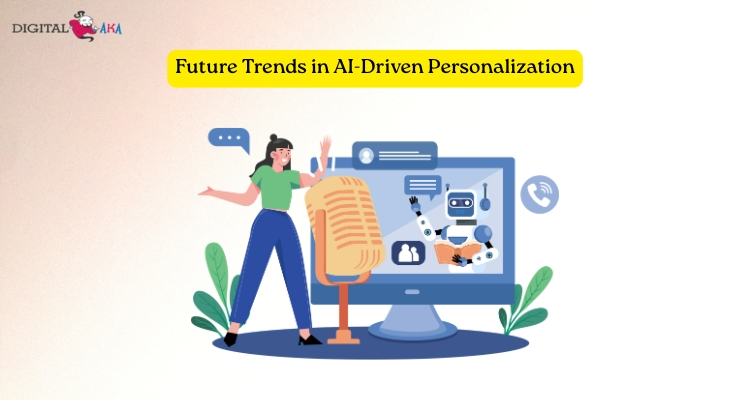
1. Hyper-Personalization: This is when companies go beyond just using a customer’s name or previous purchases. Hyper-personalization delivers experiences that are highly tailored to each individual. For example, if a customer is browsing a website, AI can instantly suggest products based on their preferences, location, and even the time of day. It’s about making the experience feel unique to each person in real-time, rather than offering a one-size-fits-all solution.
2. Voice and Conversational AI: Voice assistants like Siri or Alexa and chatbots are becoming more common in helping brands interact with customers. With voice and conversational AI, companies can offer personalized customer service and recommendations just by having a conversation. This type of AI listens to what the customer says and understands their needs, making the interaction feel more personal and natural. For example, you might ask a voice assistant to recommend a restaurant or product, and it will give you suggestions based on your past choices.
3. Predictive Personalization: Predictive AI can foresee what customers might want before they even ask. By analyzing past behaviors and patterns, AI can predict future actions. For example, if someone regularly buys running shoes, AI might suggest new models or workout gear they might like. This approach helps businesses offer solutions before the customer has to look for them.
4. Ethical Personalization: As companies collect more personal data to create customized experiences, they must ensure that customers’ privacy is protected. Ethical personalization means balancing personalized content with respect for privacy. Businesses need to be transparent about how they use data and give customers control over their information.
Conclusion
Integrating AI-driven personalization across various domains is revolutionizing how organizations interact with individuals, leading to more meaningful and effective engagements. By embracing AI technologies, businesses and institutions can deliver personalized experiences that not only meet expectations but also exceed them, fostering loyalty, satisfaction, and growth.
As we move forward, the continued evolution of AI-driven personalized learning, AI-driven personal engagement, and AI-driven personalization email marketing will undoubtedly shape the future of education, marketing, and beyond, making personalization not just a strategy but a fundamental aspect of human-centric design and interaction.
FAQs
1. What is AI-driven personalization and how does it work?
AI-driven personalization uses artificial intelligence to tailor experiences, content, and messaging for individual users based on their behaviors, preferences, and data. AI analyzes large datasets in real time to create customized journeys, making interactions more relevant and engaging.
2. How does AI-driven personalization enhance email marketing campaigns?
In AI-driven personalization email marketing, AI algorithms tailor subject lines, content, and send times based on each recipient’s behavior and preferences. This boosts open rates, click-throughs, and conversions by ensuring the message is truly relevant to each individual.
3. What is the difference between traditional personalization and AI-driven personalization?
Traditional personalization often uses static rules or manual segmentation. In contrast, AI-driven personalization leverages machine learning to dynamically adjust content and experiences in real time based on evolving user data and behavior patterns.
4. How does AI-driven personalized learning improve education outcomes?
AI-driven personalized learning adapts teaching materials to a student’s unique pace, learning style, and understanding. It offers real-time feedback, personalized quizzes, and customized lessons, which boosts engagement and academic performance.
5. Can AI-driven personalization help with customer engagement across industries?
Absolutely. AI-driven personal engagement helps businesses in healthcare, finance, retail, and more by providing tailored interactions, timely recommendations, and responsive support, which enhances customer satisfaction and loyalty.
6. Is AI-driven personalization marketing suitable for small businesses?
Yes, AI-driven personalization marketing can be scaled to fit businesses of all sizes. Small businesses can use AI tools to create personalized email campaigns, product recommendations, and customer interactions, increasing their ROI with minimal effort.
7. What are the key tools used in AI-driven email personalization?
Some popular tools for AI-driven email personalization include Mailchimp with AI, Salesforce Einstein, HubSpot, and custom-built AI engines. These platforms analyze user behavior and automate content personalization at scale.
8. How does AI ensure better user engagement through personalization?
By analyzing user data in real time, AI-driven personal engagement systems can deliver highly relevant messages, offers, and content, keeping users engaged and more likely to interact with your brand.
9. What role does data privacy play in AI-driven personalization?
Data privacy is crucial. Ethical AI-driven personalization requires businesses to be transparent about data use, obtain user consent, and ensure strong data protection measures are in place, especially in fields like AI-driven personalized learning and finance.
10. How can businesses get started with AI-driven personalization?
Start by selecting platforms or tools that support AI-driven personalization. Begin with one area (like AI-driven personalization email marketing), gather relevant user data, and gradually scale across other functions like web, app, and CRM personalization.

